Abstract
To ascertain the role of estrogen (ER) and progesterone (PR) receptors as prognostic indicators of resectable breast cancer, the records of 204 patients were analyzed whose receptor studies were done at the Maimonides Medical Center from 1975 to 1983. All patients had radical or modified radical mastectomies and did not show any evidence of distant metastases at the time of operation. Median follow-up was 37 months. An additional 117 patients received some form of adjuvant therapy, mainly chemotherapy, and were analyzed separately. Life table analysis using the log rank test for measuring significance, and a Cox multivariate analysis was performed. At 48 months, 22% of the ER positive (ER+) group versus 33% of the ER negative (ER-) group had recurred as compared to 16% and 35% for the PR+ versus PR- groups, respectively. Life table analysis of the disease free interval (DFI) showed that the difference between the ER+ and ER- groups was not significant (p greater than 0.1), while the difference in DFI between the PR+ and PR- groups was significant (p less than 0.05). Multivariate analysis revealed that the most important factors in predicting the DFI were nodal status (p less than 0.001), tumor size (p less than 0.025), and progesterone receptor status (p less than 0.05). Estrogen receptor status was not found to be significant. In conclusion, PR- patients have a shorter DFI than PR+ patients and that PR status is a more valuable predictor of DFI than ER status.
Full text
PDF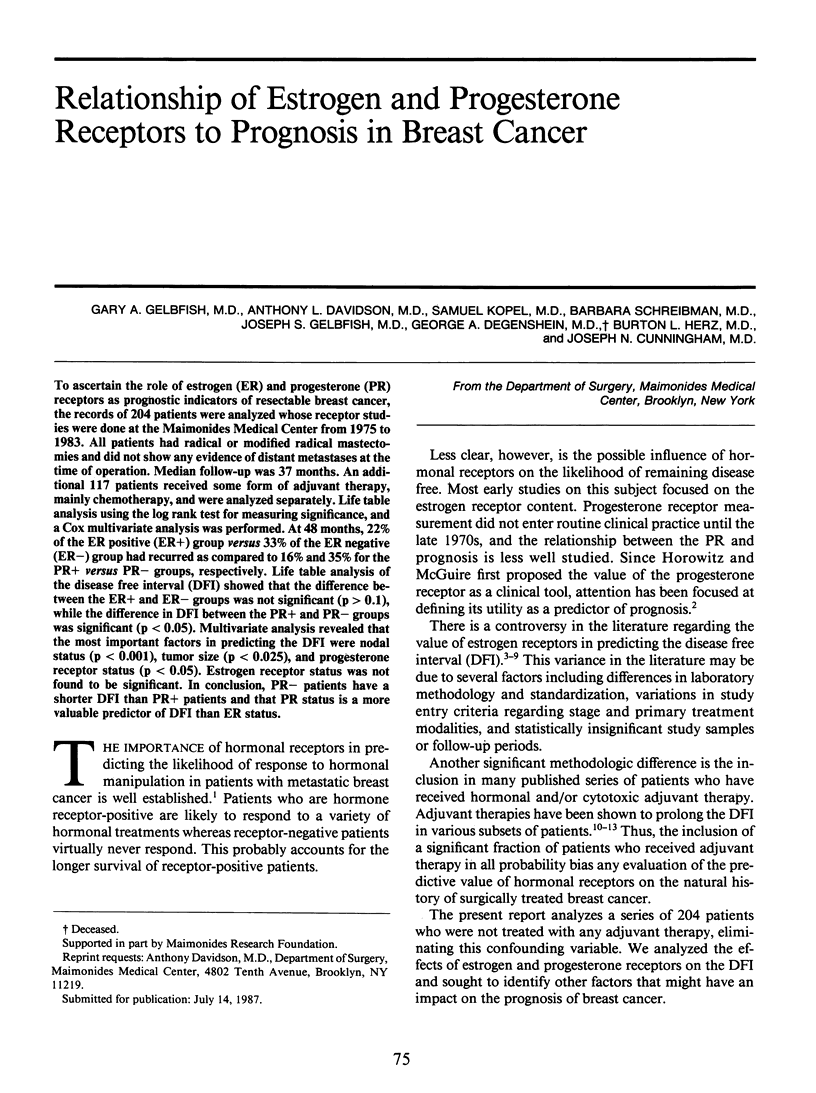
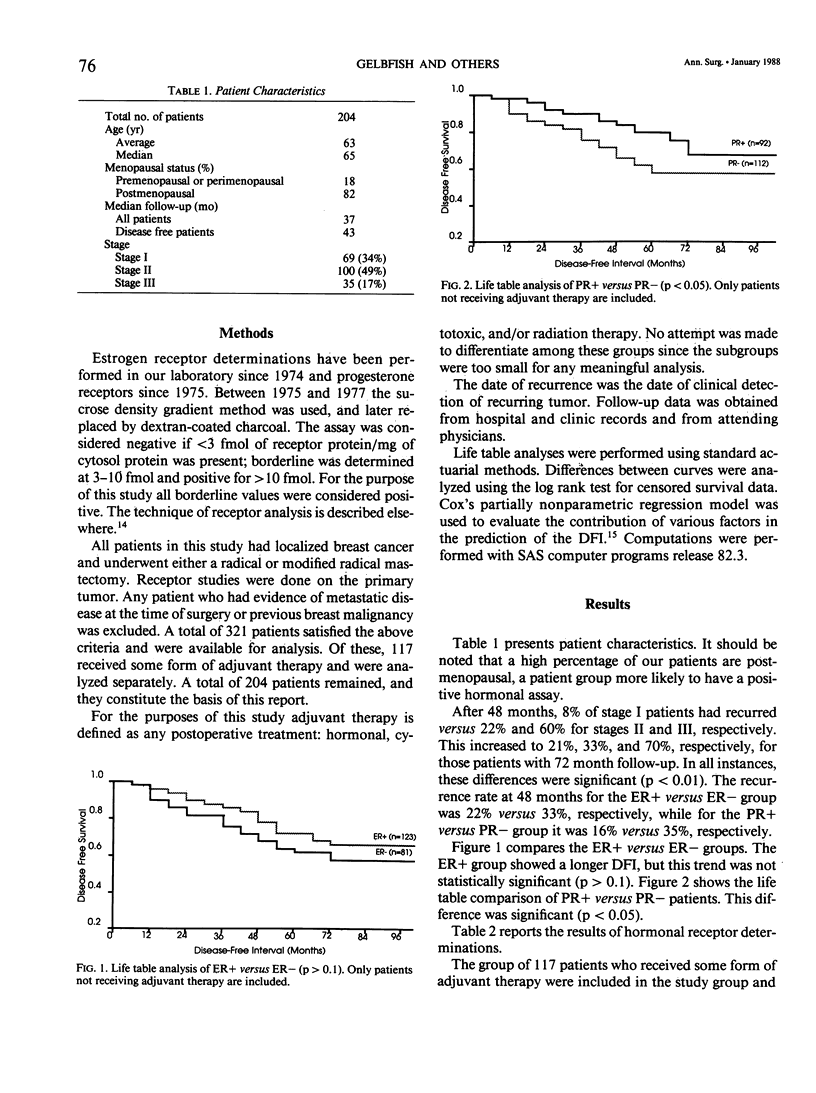
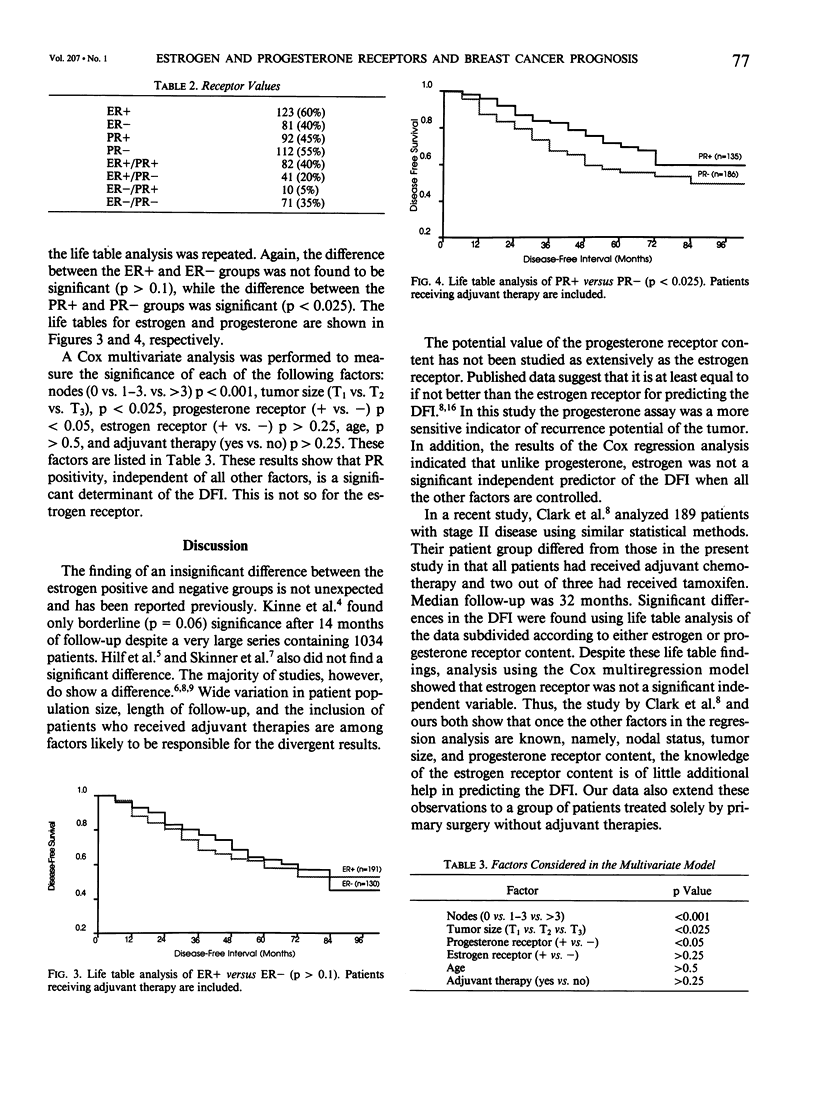
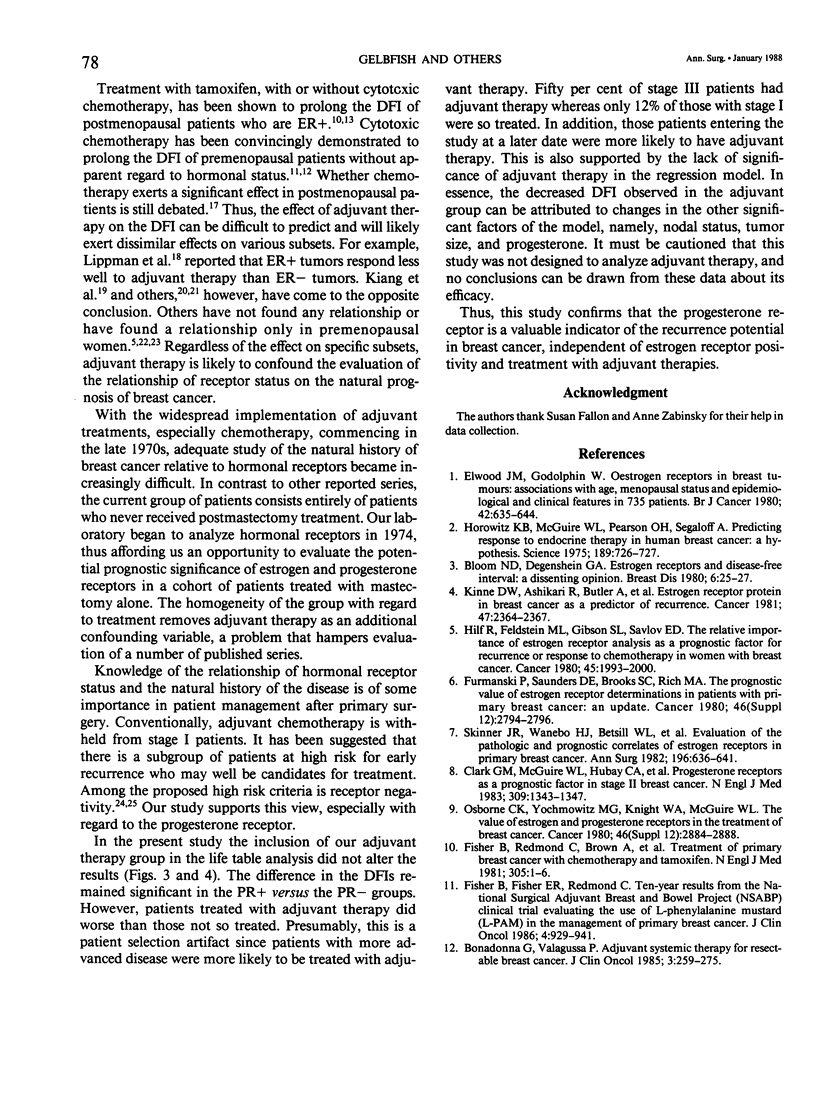
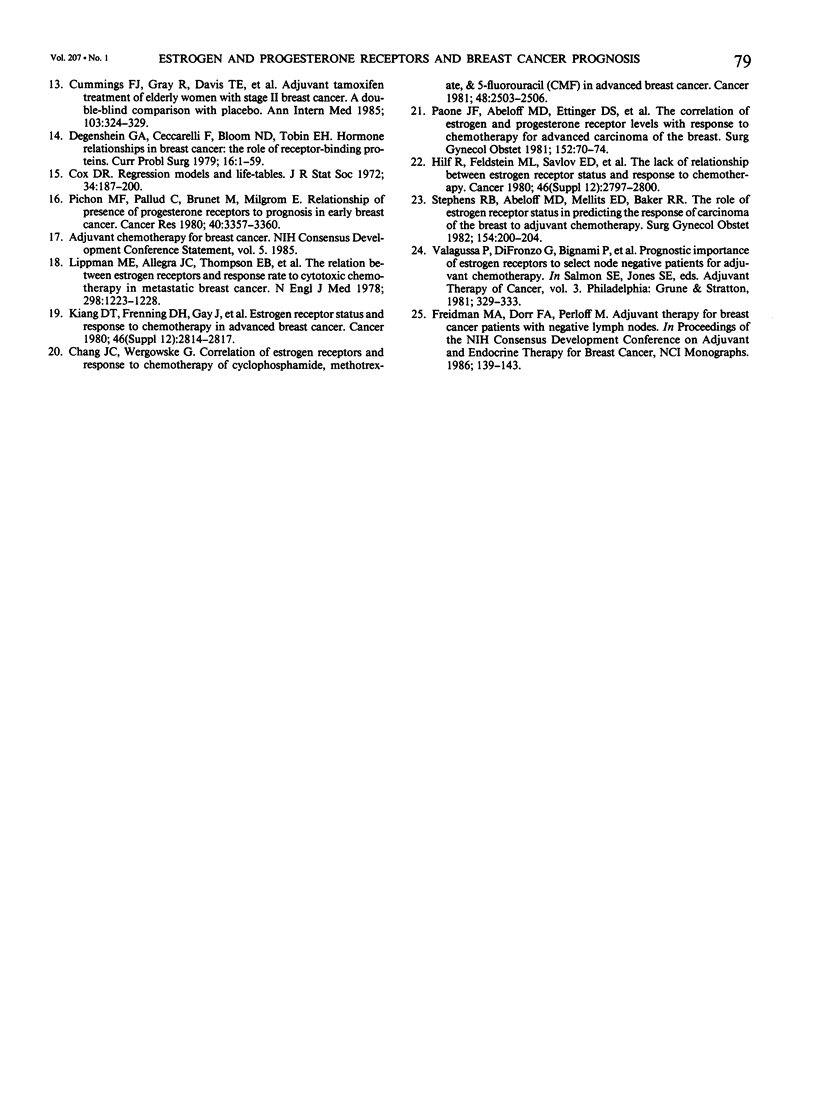
Selected References
These references are in PubMed. This may not be the complete list of references from this article.
- Bonadonna G., Valagussa P. Adjuvant systemic therapy for resectable breast cancer. J Clin Oncol. 1985 Feb;3(2):259–275. doi: 10.1200/JCO.1985.3.2.259. [DOI] [PubMed] [Google Scholar]
- Chang J. C., Wergowske G. Correlation of estrogen receptors and response to chemotherapy of cyclophosphamide, methotrexate, and 5-fluorouracil (CMF) in advanced breast cancer. Cancer. 1981 Dec 1;48(11):2503–2506. doi: 10.1002/1097-0142(19811201)48:11<2503::aid-cncr2820481126>3.0.co;2-t. [DOI] [PubMed] [Google Scholar]
- Clark G. M., McGuire W. L., Hubay C. A., Pearson O. H., Marshall J. S. Progesterone receptors as a prognostic factor in Stage II breast cancer. N Engl J Med. 1983 Dec 1;309(22):1343–1347. doi: 10.1056/nejm198312013092240. [DOI] [PubMed] [Google Scholar]
- Cummings F. J., Gray R., Davis T. E., Tormey D. C., Harris J. E., Falkson G., Arseneau J. Adjuvant tamoxifen treatment of elderly women with stage II breast cancer. A double-blind comparison with placebo. Ann Intern Med. 1985 Sep;103(3):324–329. doi: 10.7326/0003-4819-103-3-324. [DOI] [PubMed] [Google Scholar]
- Degenshein G. A., Ceccarelli F., Bloom N. D., Tobin E. H. Hormone relationships in breast cancer: the role of receptor-binding proteins. Curr Probl Surg. 1979 Jun;16(6):1–59. doi: 10.1016/s0011-3840(79)80014-3. [DOI] [PubMed] [Google Scholar]
- Elwood J. M., Godolphin W. Oestrogen receptors in breast tumours: associations with age, menopausal status and epidemiological and clinical features in 735 patients. Br J Cancer. 1980 Nov;42(5):635–644. doi: 10.1038/bjc.1980.296. [DOI] [PMC free article] [PubMed] [Google Scholar]
- Fisher B., Fisher E. R., Redmond C. Ten-year results from the National Surgical Adjuvant Breast and Bowel Project (NSABP) clinical trial evaluating the use of L-phenylalanine mustard (L-PAM) in the management of primary breast cancer. J Clin Oncol. 1986 Jun;4(6):929–941. doi: 10.1200/JCO.1986.4.6.929. [DOI] [PubMed] [Google Scholar]
- Fisher B., Redmond C., Brown A., Wolmark N., Wittliff J., Fisher E. R., Plotkin D., Bowman D., Sachs S., Wolter J. Treatment of primary breast cancer with chemotherapy and tamoxifen. N Engl J Med. 1981 Jul 2;305(1):1–6. doi: 10.1056/NEJM198107023050101. [DOI] [PubMed] [Google Scholar]
- Furmanski P., Saunders D. E., Brooks S. C., Rich M. A. The prognostic value of estrogen receptor determinations in patients with primary breast cancer: an update. Cancer. 1980 Dec 15;46(12 Suppl):2794–2796. doi: 10.1002/1097-0142(19801215)46:12+<2794::aid-cncr2820461410>3.0.co;2-n. [DOI] [PubMed] [Google Scholar]
- Hilf R., Feldstein M. L., Gibson S. L., Savlov E. D. The relative importance of estrogen receptor analysis as a prognostic factor for recurrence or response to chemotherapy in women with breast cancer. Cancer. 1980 Apr 15;45(8):1993–2000. doi: 10.1002/1097-0142(19800415)45:8<1993::aid-cncr2820450802>3.0.co;2-2. [DOI] [PubMed] [Google Scholar]
- Hilf R., Feldstein M. L., Savlov E. D., Gibson S. L., Seneca B. The lack of relationship between estrogen receptor status and response to chemotherapy. Cancer. 1980 Dec 15;46(12 Suppl):2797–2800. doi: 10.1002/1097-0142(19801215)46:12+<2797::aid-cncr2820461411>3.0.co;2-b. [DOI] [PubMed] [Google Scholar]
- Horwitz K. B., McGuire W. L. Predicting response to endocrine therapy in human breast cancer: a hypothesis. Science. 1975 Aug 29;189(4204):726–727. doi: 10.1126/science.168640. [DOI] [PubMed] [Google Scholar]
- Kiang D. T., Frenning D. H., Gay J., Goldman A. I., Kennedy B. J. Estrogen receptor status and response to chemotherapy in advanced breast cancer. Cancer. 1980 Dec 15;46(12 Suppl):2814–2817. doi: 10.1002/1097-0142(19801215)46:12+<2814::aid-cncr2820461415>3.0.co;2-d. [DOI] [PubMed] [Google Scholar]
- Kinne D. W., Ashikari R., Butler A., Menendez-Botet C., Rosen P. P., Schwartz M. Estrogen receptor protein in breast cancer as a predictor of recurrence. Cancer. 1981 May 15;47(10):2364–2367. doi: 10.1002/1097-0142(19810515)47:10<2364::aid-cncr2820471007>3.0.co;2-s. [DOI] [PubMed] [Google Scholar]
- Lippman M. E., Allegra J. C., Thompson E. B., Simon R., Barlock A., Green L., Huff K. K., Do H. M., Aitken S. C., Warren R. The relation between estrogen receptors and response rate to cytotoxic chemotherapy in metastatic breast cancer. N Engl J Med. 1978 Jun 1;298(22):1223–1228. doi: 10.1056/NEJM197806012982203. [DOI] [PubMed] [Google Scholar]
- Osborne C. K., Yochmowitz M. G., Knight W. A., 3rd, McGuire W. L. The value of estrogen and progesterone receptors in the treatment of breast cancer. Cancer. 1980 Dec 15;46(12 Suppl):2884–2888. doi: 10.1002/1097-0142(19801215)46:12+<2884::aid-cncr2820461429>3.0.co;2-u. [DOI] [PubMed] [Google Scholar]
- Paone J. F., Abeloff M. D., Ettinger D. S., Arnold E. A., Baker R. R. The correlation of estrogen and progesterone receptor levels with response to chemotherapy for advanced carcinoma of the breast. Surg Gynecol Obstet. 1981 Jan;152(1):70–74. [PubMed] [Google Scholar]
- Pichon M. F., Pallud C., Brunet M., Milgrom E. Relationship of presence of progesterone receptors to prognosis in early breast cancer. Cancer Res. 1980 Sep;40(9):3357–3360. [PubMed] [Google Scholar]
- Skinner J. R., Wanebo H. J., Betsill W. L., Jr, Wilhelm M. C., Drake C. R., Macleod R. M. Evaluation of the pathologic and prognostic correlates of estrogen receptors in primary breast cancer. Ann Surg. 1982 Dec;196(6):636–641. doi: 10.1097/00000658-198212001-00003. [DOI] [PMC free article] [PubMed] [Google Scholar]
- Stephens R. B., Abeloff M. D., Mellits E. D., Baker R. R. The role of estrogen receptor status in predicting the response of carcinoma of the breast to adjuvant chemotherapy. Surg Gynecol Obstet. 1982 Feb;154(2):200–204. [PubMed] [Google Scholar]


